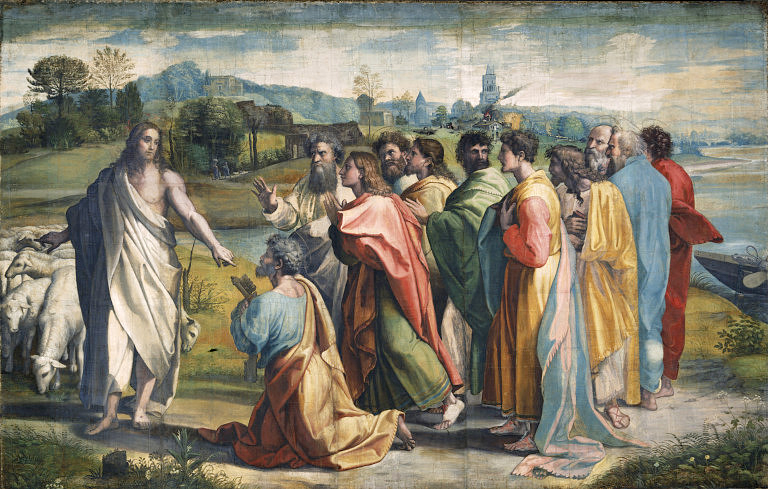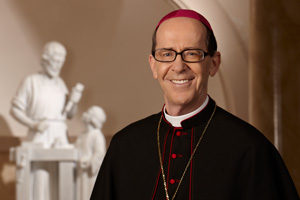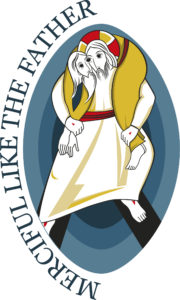

[quote_box_center]
Column in Spanish * Column in Español
[/quote_box_center]
[dropcap type=”3″]J[/dropcap]esus was preparing Peter to be the first pope from the first day that He started to call disciples. Little but significant actions reveal this to us. For example, on that first day when Jesus called four fishermen — Peter, Andrew, James and John — as they were cleaning their nets on the seashore, it was Peter whom He asked to pull out a little from the shore so that He could teach a large crowd from his boat.

Of all His disciples, the only one to whom Jesus gave a new name was Simon, whom He called Peter, saying to him (Mt 16:18) “…upon this rock, I will build my Church.” Then, at the Last Supper, it was Peter’s feet that Jesus washed first before the rest of the Twelve; and it was to Peter alone that Jesus said (Lk 22:31), “Simon, Simon, behold Satan has demanded to sift all of you like wheat, but I have prayed that your own faith may not fail; and once you have turned back, you must strengthen your brothers.”
From these experiences, it became evident to all the Twelve that Peter was chosen to be their leader. Thus, he was the one among the Twelve who asked Jesus to explain the meaning of His parables and His precepts. After the Bread of Life discourse when most of His disciples walked away in disbelief (Cf. John 6) and Jesus asked the Twelve, “Will you also go away?” it was Peter who spoke on behalf of the others, saying, “Lord, to whom shall we go? You alone have the words of everlasting life.”
What most prepared Peter to be the first pope was the way Jesus dealt with his burden of guilt after his triple betrayal of his Master. Recall how, after His Resurrection, Christ asked Peter three times if he loved Him. This was not done to further humiliate Peter but to heal his wounds of shame, giving him the opportunity to respond three times, “Yes, Lord, I love you.”
 To understand the depths of Jesus’ solidarity with Peter, it is helpful to know that the way He asked the question the third time was different from the first two times (Cf. Jn 21:15ff). He used a different Greek word the last time: “Phileis me?” in place of “Agapas me?” The first two times, Jesus was asking “Agapas me?”, “Do you love with me with an unconditional, total love?” Peter, being keenly aware of his own weakness, could not, in all honesty, respond “Agapo se”, “I love you unconditionally.” But he could say “Philo se,” “I love you;” and that is what he did. So, the third time, Jesus put Himself at the same level as Peter and asked, “Phileis me?” knowing that Peter really desired to love unconditionally but knew from bitter experience that he could not do so; it was beyond his own strength. Peter’s answer reflected real honesty, sincere sorrow, true conversion and humble awareness that Jesus’ words at the Last Supper were true (Jn 15:5), “Without me, you can do nothing.”
To understand the depths of Jesus’ solidarity with Peter, it is helpful to know that the way He asked the question the third time was different from the first two times (Cf. Jn 21:15ff). He used a different Greek word the last time: “Phileis me?” in place of “Agapas me?” The first two times, Jesus was asking “Agapas me?”, “Do you love with me with an unconditional, total love?” Peter, being keenly aware of his own weakness, could not, in all honesty, respond “Agapo se”, “I love you unconditionally.” But he could say “Philo se,” “I love you;” and that is what he did. So, the third time, Jesus put Himself at the same level as Peter and asked, “Phileis me?” knowing that Peter really desired to love unconditionally but knew from bitter experience that he could not do so; it was beyond his own strength. Peter’s answer reflected real honesty, sincere sorrow, true conversion and humble awareness that Jesus’ words at the Last Supper were true (Jn 15:5), “Without me, you can do nothing.”
The Successor to Peter today, Pope Francis, says that mercy “expresses God’s way of reaching out to the sinner, offering him a new chance to look at himself, convert, and believe” (Misericordiae Vultus, 21).
That is what the Risen Christ did for Peter. By Christ’s mercy, Peter was freed of his guilt and shame and freed for his mission from Christ. Now, Peter could be, by God’s mercy and his own humble cooperation, what he could never have been before, the rock on which Christ builds His Church.
Years after this exchange between the Risen Lord and the first Pope, Peter wrote the first of his two New Testament Letters. As he begins, he overflows with gratitude and joy (1 Pt 1:3): “Blessed be the God and Father of our Lord Jesus Christ, who in His great mercy gave us a new birth to a living hope through the resurrection of Jesus Christ from the dead.





![[VIDEO] Make Sunday feel like Sunday again](https://www.catholicsun.org/wp-content/uploads/2021/04/2021-YOUTUBE-BISHOP-MESSAGE-THUMBNAIL-ENGLISH-218x150.png)